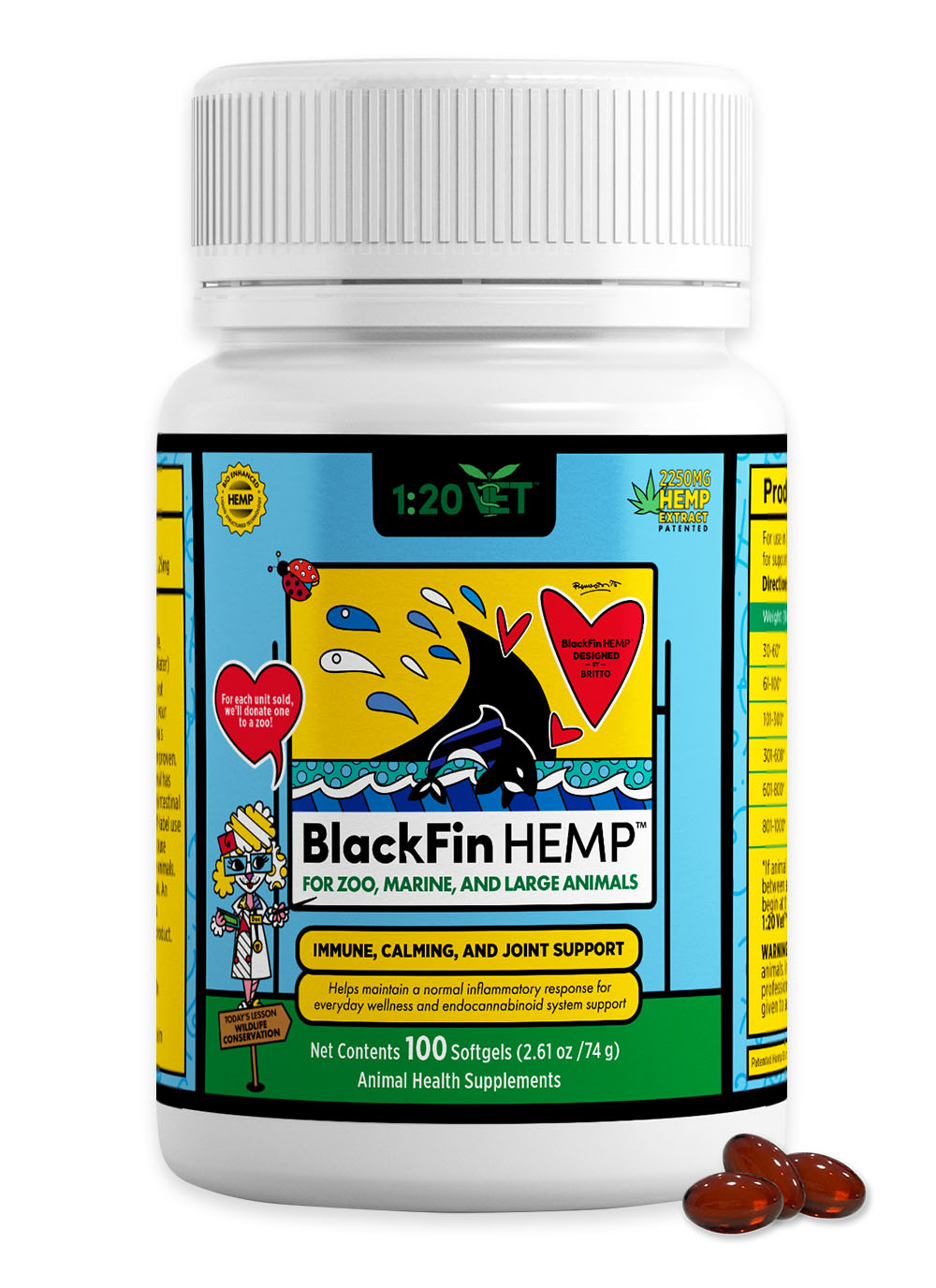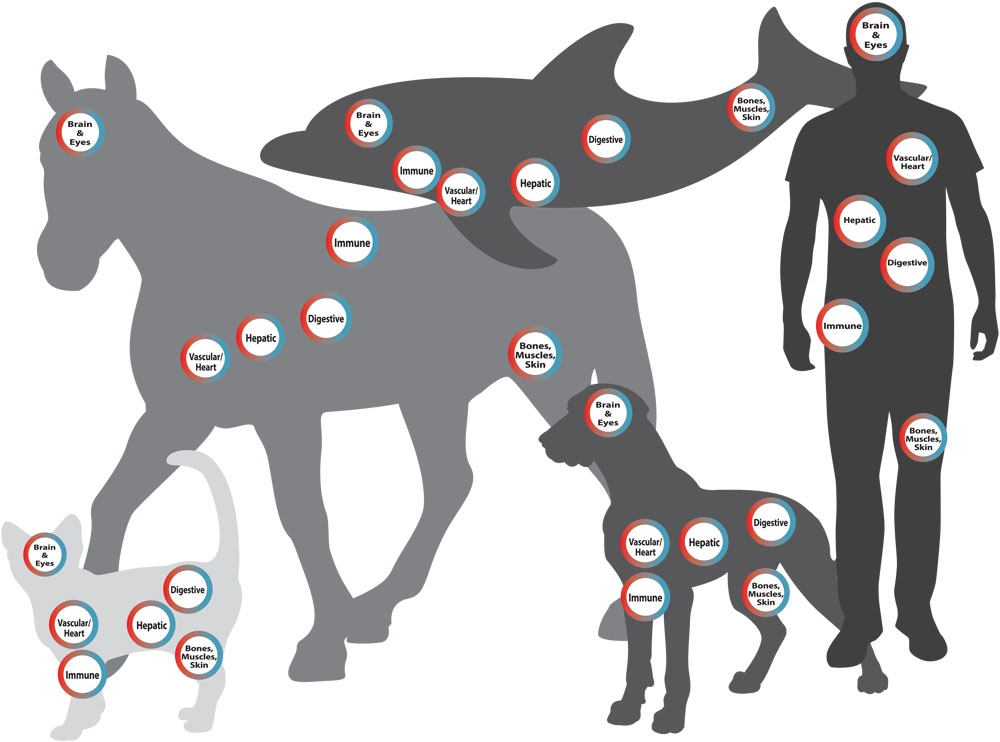



BlackFin HEMP™ is for zoo and aquarium animals and enhances joint health and the immune response. This HEMP provides a small vessel that encapsulates the HEMP molecules and carries them past the harsh acidic environment of the stomach. The HEMP molecules are protected, impervious to acidic destruction.
In an exclusive collaboration with world renowned artist ROMERO BRITTO, 1:20 Vet™ provides this high-quality HEMP supplement while educating on zoo and wildlife health care and conservation.
BlackFin HEMP™ is the first to be administered and studied in marine animals to help improve discomfort.

1:20 Vet™, LLC, a division of Animal Necessity, LLC, maker of the worldwide leading veterinary vision supplement in companion and marine animals, brings you BlackFin HEMP™.
In an exclusive collaboration with world renowned artist ROMERO BRITTO, 1:20 Vet™ provides this high-quality HEMP supplement while educating on zoo and wildlife health care and conservation.
BlackFin HEMP™ is the first to be administered and studied in marine animals to help improve discomfort. Thank you for helping with HEMP and being part of the Happy Hemp Movement™!
BlackFin HEMP™ is clinically researched and trusted by Dr. Johanna Mejia-Fava, PhD in marine mammal ophthalmology, Doctor of Veterinary Medicine. This HEMP contains a patented and proprietary bio-enhanced Liquid Structure Delivery Method™ to support cellular, immune, and neurological health via the endocannabinoid system.
Anandamide, known as the “bliss/happy” molecule, promotes the neurotransmitters serotonin and GABA, to provide a calming effect along with digestive and neurological support. Anandamide also helps support a normal inflammatory response and helps regulate the immune response through CB22 receptor interactions.
A primary mechanism of CBD is the reuptake inhibition of anandamide. Normally, anandamide is chaperoned away from the synapse by a fatty acid binding protein (FABP) and broken down by fatty acid amide hydrolase (FAAH). CBD interrupts this process by preferentially binding to FABPs for a long period of time, slowing the intracellular degradation of anandamide by FAAH.
Bottom line: More anandamide means more happiness and homeostasis.


Click here to check out our article on BlackFin HEMP™ in Vegas Cannabis Magazine on issuu.com. Our team discusses the creation of BlackFin HEMP™ and how it's been helping animals with a variety of conditions. Our CBD supports the normal inflammatory response, as well as calms and relaxes and provides immune support.
In 2018, the Agriculture Improvement Act (2018 Farm Bill) was passed and authorized the production of hemp, and removed hemp and hemp seeds from the Drug Enforcement Administration’s (DEA) schedule of Controlled Substances. This allowed the U.S. Department of Agriculture (USDA) to issue programs to study industrial hemp and implement consistent regulatory framework around production of hemp throughout the United States.1 This in turn led to the mass use of hemp extract for support in humans and even different animals due to the presence of an endocannabinoid system (ECS).
What is the endocannabinoid system (ECS)? What is BlackFin HEMP™'s mechanism of action in the body?
The ECS is a complex, cell signaling pathway that helps keep our bodies in homeostasis. The ECS is believed to be present in all animals, including the Hydra (H. vulgaris), an organism in the same phylum as the jellyfish that was the first to have developed a neural network.2 Vertebrates, including mammals, birds, reptiles, and fish, and invertebrates, including sea urchins, leeches, mussels, and nematodes, are believed to have an ECS.3 The ECS involves the endogenous endocannabinoid anandamide (N-arachidonoylethanolamine, AEA), and the hemp extract in BlackFin HEMP™ helps inhibit the reuptake of anandamide, therefore keeping more of that “bliss/happy” molecule available in the nerve synapse to interact with receptors, like serotonin or GABA. These interactions help promote calming effects and relaxation in certain brain regions, among other effects. Serotonin activity additionally promotes mood balance, normal sleep habits, and appetite/digestion.4 Hemp extract can additionally encourage appetite through reducing symptoms of an upset stomach, and is also recommended for regurgitating and vomiting patients as it works on 5-HT1A receptors in the brain.5
Wait, what is anandamide?
Anandamide is a derivative of arachidonic acid (AA), which is made in the body from essential dietary omega-6 fatty acids, the most common being linoleic acid, which is essential for all animals.6 Cats, however, cannot make arachidonic acid from linolenate, as they lack sufficient desaturase enzyme activity to meet their needs.7 So arachidonic acid is an additional dietary requirement of cats and likely all other obligate carnivores. A main dietary source of AA and other omega-6 fatty acids are meat and fish, further suggesting that aquatic species and carnivores have the capability to synthesize AEA. Herbivorous browsers and grazers would have similar methods of arachidonic acid metabolism as other non-carnivore mammals,8 and therefore likely have the cannabinoid receptors as well. (Personal communication, Dr. Liz Koutsos: MS, PhD, nutritional consultant for various animal species).
Now we know that serotonin plays a major role in the brain-gut axis. When animals are in a disease state, what serological values should we monitor and what vitamins should be supplement if there is a deficiency?
In humans, 95% of serotonin is produced in the gut, and when gastritis cases occur this may lead to a decrease of B12 absorption.9 The B vitamins, specifically B12, are co-factors in the synthesis of serotonin, and a deficiency of B12 can lead to low levels of serotonin, low Alkaline-Phosphatase (ALP), and anemia with signs of lethargy and fatigue.10 In marine mammals that are prone to gastritis, a complete multi-vitamin that includes B12 should be supplemented, as frozen/thawed fish have minimal concentrations of B vitamins.11
Are there any zoo or marine animals that are currently being administered BlackFin HEMP™ or any hemp extract?
In short, yes. Experts are starting to see the potential of the use of hemp extract in zoo and marine animals. For example, Dr. Rachel Thompson (DVM, zoo veterinary consultant) described her experience with the use of hemp extract: “I have used hemp in various zoo species and saw no adverse events and (it’s use) may be advantageous for chronic causes of pain” (personal communication, unpublished data).
Currently, four Atlantic bottlenose dolphins, one California sea lion, one pelican, and one Muscovy duck are being administered BlackFin HEMP™ extract to improve ocular discomfort and digestion. Nano-domain LST such as this one provides a small vessel that encapsulates the hemp extract molecules and carries them past the harsh acidic environment of the stomach for rapid intestinal absorption and greater bioavailability. Some aquatic mammals have a low stomach pH of around 1.5-2, which is more acidic than the typical human stomach, which usually rests at around 2-3.5. This acidity further supports the need for an alternative delivery system of hemp extract in this model of animal in order to make sure the max benefit is received.
Works Cited:
1. The Agricultural Improvement Act of 2018. U.S Department of Agriculture. https://www.usda.gov/topics/hemp. Last Reviewed 2021. Accessed March 29, 2021.
2. Petrocellis LD, Melck D, Bisogno T, Milone A, Marzo VD. 1999. Finding of the endocannabinoid signaling system in Hydra, a very primitive organism: possible role in feeding response. Neuroscience 92:377-387.
3. Silver RJ. 2019. The endocannabinoid system of animals. Animals 9:686.
4. Yao K, Fang J, Yin Y, Feng ZM, Tang ZR, Wu G. 2011. Tryptophan metabolism in animals: important roles in nutrition and health. Front Biosci 3:286-297.
5. Parker LA, Rock EM, Limebeer CL. 2011. Regulation of nausea and vomiting by cannabinoids. Br J Pharmacol 163:1411-1422.
6. The Endocannabinoid System, Our Universal Regulator. Journal of Young Investigators. https://www.jyi.org/2018-june/2018/6/1/the-endocannabinoid-system-our-universal-regulator. Published June 1, 2018. Accessed March 29, 2021
7. Sinclair AJ, McLean JG, Monger EA. 1979. Metabolism of linoleic acid in the cat. Lipids 14:932-936.
8. Wood J, Koutsos E, Kendall CJ, Minter LJ, Tollefson TN, Heugten KA. Analyses of african elephant (Loxodonta Africana) diet with various browse and pellet inclusion levels. 2019. Zoo Biology 2019:1-14.
9. Tang KN, Nollens HH, Robeck TR, Schmitt TL. 2018. Serum cobalamin and folate concentrations as indicators of gastrointestinal disease in killer whales (Orcinus orca). J Zoo Wildl Med 49:564-572.
10. Kennedy DO. 2016. B vitamins and the brain: mechanisms, dose and efficacy – a review. Nutrients 8:68.
11. Mejia-Fava J, Bossart GD, Hoopes L, Divers SJ. Nutritional analysis of frozen canadian capelin (Mallotus villosus), atlantic herring (Clupea harengus), and canadian lake smelt (Osmerus mordax) over a 9-month period of frozen storage. Poster presented at 2014 International Association for Aquatic Animal Medicine; May, 2014; Gold Coast, Australia.
| Weight (lbs.) | Daily Use |
| Under 30 | Contact Us for Dosage Guidelines |
| 30 - 60 | 1 Capsule Every Other Day |
| 61 - 100 | 1 Capsule Once Daily |
| 101 - 300 | 1 Capsule AM and PM |
| 301 - 600 | 2 Capsules AM and PM |
| 601 - 800 | 3 Capsules AM and PM |
| 801 - 1000 | 4 Capsules AM and PM |
| 1001+ | Contact Us for Dosage Guidelines |
For use in Zoo, Marine, and Large Animals only. Recommended for support of immune, behavioral, and joint health.
If animal is at the higher end of the weight range and falls between a lower and higher administration recommendation, begin at the lower recommended daily use and consult with 1:20 Vet™. Store tightly sealed in a cool dry place.
Warnings: Keep out of the reach of children and animals. In case of accidental overdose, contact a health professional immediately. This product should not be given to animals intended for human consumption.
| Active Ingredients | Amount Per Serving |
| Hemp Extract | 25 mg |
| Inactive Ingredients: Ethanol, Medium chain triglycerides, Polyoxyethylene sorbitan monooleate, Vegetable oil, Softgel (Gelatin, Glycerin, Purified Water) | |